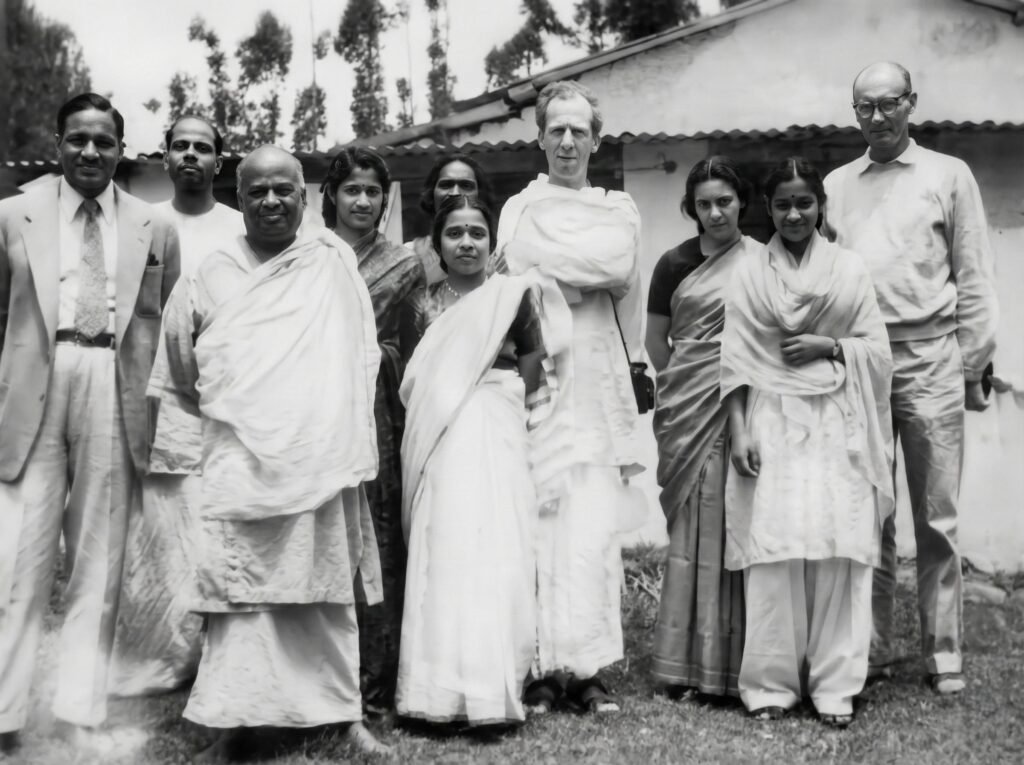
At the core of Nataraja Guru’s life was his deep connection with Narayana Guru, a renowned seer, mystic, poet, philosopher, and social reformer from Kerala. Their relationship transcended the typical teacher-disciple dynamic, creating a spiritual synergy that shaped Nataraja Guru’s mission and endeavors. Nataraja Guru first met Narayana Guru during his childhood, thanks to his father, Dr. Palpu, a dedicated follower of Narayana Guru. This early introduction ignited a lifelong spiritual journey for Nataraja Guru. After completing his education, he chose to fully commit to Narayana Guru’s teachings, inspired by a moment when Narayana Guru’s simplicity and ascetic lifestyle profoundly impacted him. Narayana Guru’s statement, “All I need is a bar of soap,” exemplified the minimalist ethos that guided his life.
Nataraja Guru spent three transformative years learning under Narayana Guru in Varkala. During this time, he became a key interpreter of his mentor’s teachings, simplifying complex philosophies for broader understanding. Together, they worked to present Advaita Vedanta as a universal philosophy that transcends cultural and religious barriers. Even after Narayana Guru’s passing in 1928, Nataraja Guru continued to spread his teachings through writings, establishing Gurukulas in the name of his guru, and engaging in global dialogues, firmly anchoring his worldview in Narayana Guru’s wisdom.
First Meeting in South India
Nataraja Guru orchestrated a significant meeting between Rabindranath Tagore and Narayana Guru in South India, with the assistance of Rev. C.F. Andrews, a close associate of Tagore. This encounter strengthened the philosophical ties between these influential thinkers and highlighted their mutual respect and admiration.
Reunion in Europe
Years later, in Geneva, Nataraja Guru facilitated another meeting between Tagore and other intellectuals at Miss Josephine De Storey’s serene villa. This gathering included notable figures like H.G. Wells and Romain Rolland. During their discussions, Tagore shared his challenges in fundraising for Shantiniketan and expressed his discomfort with certain traditional practices in Calcutta. These interactions showcased the blend of cultural appreciation and critical reflection that characterized Tagore’s engagement with Western intellectuals.
Nataraja Guru’s interactions with Mahatma Gandhi were marked by mutual respect and a shared spiritual lineage. They met twice, once at Sivagiri and again in Europe, where Gandhi’s humble yet impactful presence left a lasting impression on Nataraja Guru. Their connection went beyond personal meetings, with Gandhi showing respect for Nataraja Guru’s role as a disciple of Narayana Guru by supporting educational initiatives, such as sending Hindi teachers to the Gurukula in Nilgiri, Ooty.
Meeting in Varkala
In addition to their notable encounters, Nataraja Guru also met Mahatma Gandhi in Varkala during one of Gandhi’s visits to Narayana Guru’s ashram. At that time, Nataraja Guru was residing as an inmate of the ashram established by Narayana Guru. This meeting further solidified their bond, reflecting their shared commitment to spiritual and social causes.
In Switzerland, Nataraja Guru met the esteemed French writer Romain Rolland at a picturesque lakeside villa. Intrigued by Guru Narayana’s teachings, Rolland engaged in deep discussions with Nataraja Guru on topics like the misuse of religion and India’s cultural diversity. Their conversations bridged Eastern and Western philosophies, fostering a rich exchange of ideas.
Nataraja Guru and Garry Davis first connected aboard the SS America, where Davis had renounced American citizenship to become a “World Citizen”. Their philosophical exchanges on ‘Geo-dialectics’, a concept merging global issues with dialectical reasoning, led to collaborative efforts, including drafting a ‘Memorandum on World Government’. Despite some differences, their shared vision for global unity highlighted the power of cross-cultural collaboration.
While in Geneva, Nataraja Guru met Dr. Adolphe Ferrière, a pioneer in progressive education. Ferrière’s focus on child-centric and experiential learning deeply influenced the educational principles of the Gurukula system, integrating spiritual education with modern teaching methods.
Renowned psychologists Dr. Edouard Claparède and Dr. Pierre Bovet mentored Nataraja Guru at the Institut Jean-Jacques Rousseau. Their insights into education emphasized the importance of the teacher-student relationship, a fundamental aspect of the Gurukula philosophy.
Irish intellectuals James and Margaret Cousins, who were passionate about Indian culture, collaborated with Nataraja Guru on multiple occasions. Their involvement in celebrating Narayana Guru’s birth anniversary in Europe exemplified the cross-cultural dialogues that Nataraja Guru promoted.
During his time in Europe, Nataraja Guru received significant support from Dr. Privat, a Swiss philosopher, and Miss Edith Roberts, a Quaker from Wales. Their shared values of simplicity, ethical living, and the integration of Eastern and Western wisdom enriched Nataraja Guru’s philosophical outlook.
In Paris, Nataraja Guru attended classes and lectures at the Sorbonne, engaging with prominent intellectuals like Professor Masson-Oursel and O. Lacombe. While Natarajan was a research scholar at Paris, Henri Bergson, a Nobel Laureate, was a faculty member at the University of Paris, and his thought also had a profound influence on Nataraja Guru. These interactions deepened his understanding of how to bridge Indian spirituality with Western philosophical traditions, further enhancing the educational framework of the Gurukula.
Copyright ©2025 Nataraja Guru. All Rights Reserved.